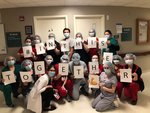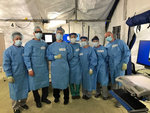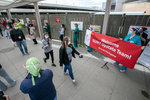


Three nurses from Stony Brook University Hospital shared their experiences on the front lines fighting the COVID-19 pandemic for the past couple of months. Their stories were shared as part of a recent episode of the “Beyond the Expected” podcast in honor of National Nurses Week.
Hosted by interim president of SBU Michael Bernstein, the podcast highlighted how the nurses and other health care workers have stepped up during this crisis to help with physical care, but also emotional care.
“They’ve also developed creative solutions that are helping to comfort patients, save lives, and keep themselves and their colleagues healthy, strong and energized,” Bernstein said.
The COVID-19 crisis has exploded largely because of the novelty of the virus, part of the coronavirus family. In the beginning, new cases were rapid and preparations were going beyond what nurses had seen before.
“Our staff coming through the door know that today might be different than yesterday,” said Alison Rowe, associate director of nursing, department of emergency and cardiology services.
Staff are now dressed top to bottom in personal protective equipment, something they’ve used sparingly in the past but is now a requirement to stay safe. They have also had to adjust to the lack of visitors for patients, which leaves many feeling lonely and fearful. And when the first cases were brought to the hospital, nurses had stepped up to do the other jobs that are important in patient care, like taking out garbage, cleaning rooms, and more. Those roles have since returned to other staff members.
Staff are also being screened on a daily basis to make sure anyone showing symptoms does not come to work. They take their temperature before and after shifts, and any symptoms are closely monitored. And this is a new normal to which staff has adjusted for the foreseeable future.
“We’re going to be doing this for months,” Rowe said.
And the quick changes were necessary, as cases spiked and more space was needed to separate COVID-19 patients from the rest of the hospital. An outdoor tent was built to house additional patients to prevent backup in the emergency room.
“Without creating an alternative space for our emergency department patients to be seen in, they would have been shoulder to shoulder in our waiting room,” Rowe said. “It was critical that we created an alternative space.”
Nurses have banded together in the fight against COVID-19, and staff at Stony Brook is working together to keep going strong. Lesley Pronesti, Teaching & Resource Center Nurse III, Surgical Oncology, created the #InThisTogether campaign on social media, which highlighted the bond that health care workers share. And Cindyann Beck, nursing policy coordinator, department of regulatory affairs, helped to implement a “Behind the Mask” campaign, where nurses and other staff display a photo of themselves with some information or a reassuring phrase, in order to give comfort to patients who are unable to see them behind the PPE.
“They give themselves selflessly, with such courage,” Pronesti said of her nursing colleagues.
The hospital has set up a respite area for staff, where they can grab a snack and get away from the scene for a few minutes. It’s become a place where nurses, technicians, doctors, and more can connect.
And further support has come from upstate, where nurses from SUNY Upstate Medical Center in Syracuse were brought in to help the staff at SBU. And some have even volunteered to stay longer than planned in order to help out.
“I don’t know how we can ever thank them,” Beck said.
And one of the most significant relationships are those developed between patients and the many nurses and other staff at the hospital. Connections are made, and staff has implemented ways to make the patients more comfortable. They’ve volunteered their phones and other devices to video chat with a patient’s family. They’ve spent time checking in as a patient moves to different hospital units.
“We become their family,” Pronesti said. “We become the ones that they depend on, the ones they look to for reassurance, to help them feel better.”
And as for their home lives and balancing personal and professional concerns, the nurses are mainly focused on doing the right thing to stay safe with their patients and their families.
“You need to know that when you come to work, you’re doing the best you can for the most people that you can,” Rowe said.
Comments
No comments on this item Please log in to comment by clicking here